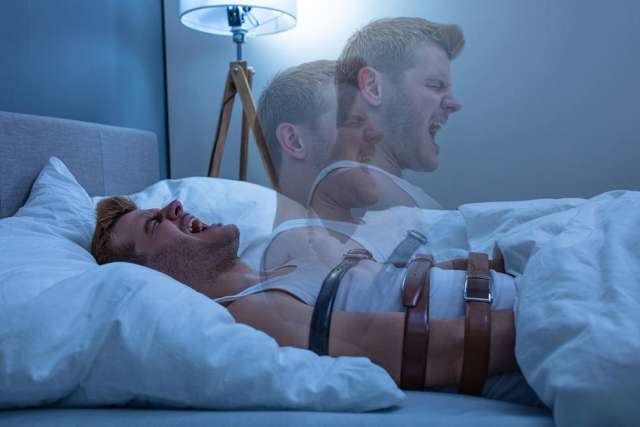“I’m awake, but I can’t move my body!”
Some of us can relate to that feeling. We might either be falling asleep or waking up from sleep and we find ourselves unable to move. We’re consciously aware that we are awake, but there is a suffocating feeling that something or someone is preventing us from moving.
“It feels like you’re trapped in your body,” says Susie Fong, MD, a UCLA Health sleep medicine physician who practices in Encino, Beverly Hills and Santa Clarita.
“The person has lost muscle control. Their eyes are able to move and they can breathe – those are the only muscles functioning at that time.”
Involuntary muscles, such as the diaphragm will continue to move because that’s how the person in sleep paralysis is able to breathe. The voluntary muscles such as the arms and legs are unable to move.
That’s because, when we are in REM sleep, our brain paralyzes our muscles, except for the eye and respiratory muscles, Dr. Fong says. This is called “REM atonia.”
REM, which stands for rapid eye movement, is a phase of sleep where the eyes flutter rapidly in a series of directions. People often dream in this sleep stage.

REM atonia is necessary because without it, many of us would find ourselves waking up outside our bed, according to Dr. Fong. Sleep paralysis occurs when a person is in both REM and wake states while the body is still in a state of REM atonia.
“The idea behind REM atonia is that it keeps us from acting out our dreams,” Dr. Fong says. “If you’re running in your dreams, you don’t want to be running out of your bed.”
What makes sleep paralysis such an anxiety-heightening event is that it can last a few seconds or it can last several minutes. An episode of sleep paralysis can end on its own or it can also end when someone shakes you or talks to you. Sometimes, people can force their way out of it or just relax and let it run its course.
Causes of sleep paralysis
Sleep paralysis is considered an isolated event when it is not connected to any other sleep disorders. However, sleep paralysis is likely to occur if you find yourself experiencing the following:
- Irregular sleep patterns
- Stress
- Sleep deprivation
- Anxiety or depression
If sleep paralysis is occurring often, you may want to consider visiting a physician. Other sleep disorders associated with sleep paralysis are sleep apnea, narcolepsy, recurrent isolated sleep paralysis, and idiopathic hypersomnia.
Is sleep paralysis dangerous?
Sleep paralysis is not considered dangerous, but it is sometimes linked to other medical conditions such as narcolepsy and obstructive sleep apnea, which can be serious sleep disorders.
“It’s benign,” Dr. Fong says. “However, there are cases when it happens more often – there are patients who experience it every night. When it gets to that point, you should see a physician.”
If sleep paralysis is being caused by another condition, a doctor should be able to determine what it is, and prescribe the appropriate treatment.
Myths about sleep paralysis
Before scientists and doctors were able to explain sleep paralysis, people often associated it with superstitious or religious beliefs such as the “Night Hag” - a ghostly figure associated with sleep paralysis. Some sufferers would say they felt like there was a demonic presence in the room.
People with sleep paralysis may have hallucinations and feel like there is a dangerous person or entity in the room, Dr. Fong says. People who suffer from sleep paralysis have said it felt like someone was choking them or pressing on their chest so they could not breathe.
“It’s a case where the boundaries between the sleep and wake elements are not clear,” Dr. Fong says.

Other sleep parasomnias
Sleep paralysis is a type of parasomnia, Dr. Fong says. Parasomnias are defined as sleep disorders that are comprised of undesired physical events that occur while the person is sleeping. These sleep disorders can include sleepwalking, sleep eating, sleep cooking and acting out the events of a dream.
Dr. Fong suggests that people should visit a sleep medicine physician if they are experiencing parasomnias on a regular basis. However, practicing good sleep habits and having good sleep hygiene can often prevent parasomnias like sleep paralysis.
Things that help, Dr. Fong says, include:
- Avoiding caffeine and alcohol at night;
- Going to sleep and waking up at the same time daily, ensuring 6-8 hours of sleep
- Having a wind-down period an hour before bed;
- Using meditation apps;
- Keeping the bedroom free of noise and completely dark.
- Seeking treatment for underlying depression and anxiety disorders
“It is helpful to have a signal to your body that it’s time for bed,” Dr. Fong says. “If we don’t allow our bodies ample time to settle down before bedtime, it can contribute to insomnia or poor sleep quality.”
If you have questions about sleep disorders or want to schedule an appointment with a sleep physician, please contact the UCLA Sleep Disorders Center.




